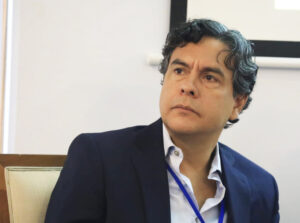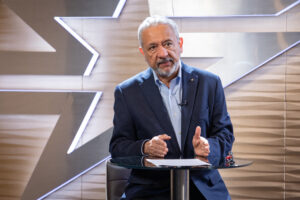This article is adapted from AQ’s special report on COP30
AQ: This year Ecuador reelected President Daniel Noboa. Bolivia, Chile and Honduras are next, while Argentina holds midterm elections in October. What trends are emerging?
VM: There are different patterns. Voters in countries like Bolivia, Ecuador and Argentina are turning away from once-dominant forces that drove early 2000s growth but failed to sustain it, leading to fragmentation and openness to new options. Meanwhile, leaders delivering on security and the economy are being reelected in the Dominican Republic, Mexico and El Salvador.
AQ: What kind of messages resonate with voters today?
VM: Voters want promises that they can walk in the streets safely and that there will be economic improvement. Corruption and internal party fights make politicians seem disconnected. Leaders like Milei in Argentina or the opposition in Bolivia benefit from this climate. The region is moving toward a tough-on-crime approach—even leftists like Chile’s Boric have adopted stricter stances.
AQ: Regional homicide rates have remained relatively stable in the past decade. Why is crime becoming more of a political topic now?
VM: Citizens have always been concerned about crime, but political elites were late arrivals to the topic. Different types of crime, like extortion, are on the rise. Due to the difficulty in resolving this issue, as a candidate, running on crime is great if you’re in the opposition, but it’s difficult if you’re the incumbent. Except if you’re Bukele.
AQ: What’s your take on the region’s upcoming presidential elections?
VM: In Bolivia, the split between Arce and Morales has fractured the MAS, opening space for many opposition candidates. It’s the first real chance in years to defeat the MAS, so everyone wants in. A united anti-MAS vote could mirror what we saw in Ecuador against correísmo. Chileans are deeply dissatisfied, and the typical left-right dynamics may not hold. With Boric’s low popularity, it’s unclear if the left can reach the runoff. On the right, there’s a battle between the more moderate Matthei, outsider Kast and ultra-outsider Kaiser. In recent years, Chile has typically chosen moderation.
AQ: What do you expect in Argentina’s legislative elections?
VM: Milei will likely win. His party is small, so there’s room to grow, and the election will serve as a referendum on him. The opposition is fragmented—Peronists, centrists and the traditional right are all divided. Even if Milei does well, it’s unclear if it’ll help with governability due to fragmentation. It may be like what happened to Macri in 2017.
AQ: Does Trump’s reelection significantly impact Latin American elections?
VM: Less so than in Canada. But he matters in other ways—economically, by influencing deals like the IMF loan to Argentina, and culturally, by emboldening right-wing populists in the region.
—
Murillo is a professor of political science and international affairs at Columbia University and a member of AQ’s editorial board.
This interview has been edited for clarity and length.









